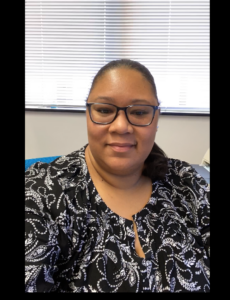By Adelle Schubarg, Environmental Research Assistant

Tashaunda Hill is the Environmental Health Program Specialist for the Pitt County Health Department. In this role, Tashaunda is largely involved with the Childhood Lead Poisoning Prevention Program where she organizes, manages, and performs lead investigations across Pitt County. Lately, the focus of her work has been on community outreach and education.
Tashaunda has always had a passion for the sciences. At the start of her undergraduate career at East Carolina University (ECU), Tashaunda studied Chemistry. However, she felt as if she was missing the human aspect and connection in her studies. It wasn’t until she took an Intro to Environmental Health Sciences (EHS) course taught by Dr. Trenton Davis that Tashaunda found her passion.
She enjoyed the interaction with people and community that the EHS field allowed while still being able to utilize her strong scientific base.
For Tashaunda, it was a more practical application of her chemistry background that allowed her to make a positive impact in the lives of others. Tashaunda graduated from ECU in 2005 with a degree in Environmental Health Sciences and accepted a position with Pitt County Government a year later. This past September marked her 15-year anniversary working with the County.
As the Program Specialist, Tashaunda oversees lead investigations in Pitt County. Most lead investigations are conducted in the home of a child with a confirmed case of lead poisoning – a level which involves having 10 or more micrograms per deciliter (𝛍g/dL) of lead in the bloodstream. These investigations tend to be more invasive and Tashaunda notes that it’s important to be sensitive to the fact that they are entering someone’s home and to understand and respect the cultural boundaries of those involved.
As these investigations are mandatory, Tashaunda wants to ensure the family feels comfortable and most of all, safe. During the home investigation, Tashaunda says that it is her job to comfort the family and clearly communicate her team’s intentions.
However, not all lead poisoning cases warrant a home investigation, which presents a real challenge for Tashaunda. For cases involving elevated blood lead levels (BLLs) ranging from 5 to 9 𝛍g/dL, a lead investigation can be offered but is not required. In such instances, the family often turns down the investigation, leading to a case of lead poisoning in a child that goes untreated.
Educating people on the dangers of lead poisoning and the resources available to them is still a challenge, Tashaunda comments. When faced with a refusal to a home investigation, Tashaunda does her best to establish a relationship with the family, offering information and resources on lead poisoning and continued follow-ups. For Tashaunda, any level of lead in a child’s bloodstream is a concern. She emphasizes the need for full home investigations for all cases, regardless of the categorized BLLs.
In addition to home investigations, Tashaunda is also responsible for conducting routine sanitation inspections for childcare centers across Pitt County. Seeing the children at these centers is one of the most enjoyable parts of the job for Tashaunda.
She says, “No matter how bad or challenging the day, you are going to see a child that will help brighten [it]”.
Knowing her work is making an impact in the lives of these children fills her with joy and makes her job that much more meaningful. Tashaunda and her team do their best to not interrupt the daily lives of the children when at a facility. However, they often end up answering questions and chatting with the kids anyway, much to Tashaunda’s delight.
Tashaunda got involved with the NC Lead and Healthy Homes Outreach Task Force after being promoted to her current position as Program Specialist in 2017. While searching for lead resources to provide to clients, families, and providers, Tashaunda came across the NC Healthy Homes website. She promptly reached out to inquire about the group and see if Pitt County could join. The Task Force has been a helpful resource for the county.
Tashaunda appreciates the collaborative nature of the group, commenting, “It is great to hear other counties’ and agencies’ successes and challenges and to be able to share that information because we are all in this together”.

